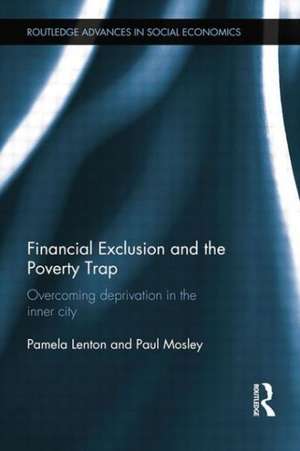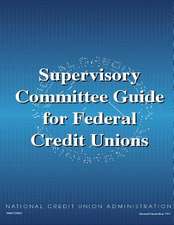Financial Exclusion and the Poverty Trap: Overcoming Deprivation in the Inner City: Routledge Advances in Social Economics
Autor Pamela Lenton, Paul Mosleyen Limba Engleză Paperback – 4 iul 2014
Over the last fifteen years, a strategy of breaking down the poverty trap has been implemented, known in the UK as community development financial institutions (CDFIs), typically non-profit lending institutions focussed on the financially excluded, and seeking to learn from the achievements of microfinance around the world. Focussing on the period 2007-09, during which the UK went into a global recession, this book investigates how CDFIs work and how well they have helped low-income people and businesses to weather that recession. Based on a study of eight CDFIs in four UK cities, we ask: what ideas for overcoming financial exclusion have worked well, and which have worked badly? What can we learn from the experience of these CDFIs which can help reduce poverty in this country and globally?
We assess the impact of CDFIs using a range of indicators (including income, assets, education, health) and ask what changes in policy by both CDFIs and government agencies (for example, benefits agencies) might be able to increase impact. Some of the key lessons are: CDFIs need to work with appropriate partners to build up savings capacity in their clients; the community environment is vital in determining who escapes from the poverty trap; and CDFIs can never function properly unless they learn how to control their overdue debts.
This book will be vital reading for those concerned with social policy, microfinance and anti-poverty policies in industrialised countries and around the world.
| Toate formatele și edițiile | Preț | Express |
|---|---|---|
| Paperback (1) | 467.44 lei 6-8 săpt. | |
| Taylor & Francis – 4 iul 2014 | 467.44 lei 6-8 săpt. | |
| Hardback (1) | 1113.95 lei 6-8 săpt. | |
| Taylor & Francis – 19 oct 2011 | 1113.95 lei 6-8 săpt. |
Din seria Routledge Advances in Social Economics
-
 Preț: 386.78 lei
Preț: 386.78 lei -
 Preț: 325.15 lei
Preț: 325.15 lei - 18%
 Preț: 998.77 lei
Preț: 998.77 lei -
 Preț: 489.26 lei
Preț: 489.26 lei -
 Preț: 284.78 lei
Preț: 284.78 lei -
 Preț: 395.90 lei
Preț: 395.90 lei -
 Preț: 414.70 lei
Preț: 414.70 lei -
 Preț: 493.34 lei
Preț: 493.34 lei -
 Preț: 469.34 lei
Preț: 469.34 lei - 21%
 Preț: 257.68 lei
Preț: 257.68 lei -
 Preț: 389.38 lei
Preț: 389.38 lei -
 Preț: 466.49 lei
Preț: 466.49 lei - 17%
 Preț: 219.59 lei
Preț: 219.59 lei -
 Preț: 482.74 lei
Preț: 482.74 lei -
 Preț: 481.20 lei
Preț: 481.20 lei -
 Preț: 415.67 lei
Preț: 415.67 lei - 18%
 Preț: 1002.63 lei
Preț: 1002.63 lei -
 Preț: 468.36 lei
Preț: 468.36 lei - 15%
 Preț: 425.62 lei
Preț: 425.62 lei - 19%
 Preț: 269.39 lei
Preț: 269.39 lei - 16%
 Preț: 337.39 lei
Preț: 337.39 lei - 15%
 Preț: 428.00 lei
Preț: 428.00 lei -
 Preț: 447.51 lei
Preț: 447.51 lei -
 Preț: 445.22 lei
Preț: 445.22 lei -
 Preț: 384.27 lei
Preț: 384.27 lei - 30%
 Preț: 848.93 lei
Preț: 848.93 lei - 18%
 Preț: 1384.17 lei
Preț: 1384.17 lei - 18%
 Preț: 1060.25 lei
Preț: 1060.25 lei
Preț: 467.44 lei
Nou
Puncte Express: 701
Preț estimativ în valută:
89.45€ • 97.14$ • 75.14£
89.45€ • 97.14$ • 75.14£
Carte tipărită la comandă
Livrare economică 22 aprilie-06 mai
Preluare comenzi: 021 569.72.76
Specificații
ISBN-13: 9781138807570
ISBN-10: 1138807575
Pagini: 248
Ilustrații: 18 black & white illustrations, 29 black & white tables, 18 black & white line drawings
Dimensiuni: 156 x 234 x 15 mm
Greutate: 0.41 kg
Ediția:1
Editura: Taylor & Francis
Colecția Routledge
Seria Routledge Advances in Social Economics
Locul publicării:Oxford, United Kingdom
ISBN-10: 1138807575
Pagini: 248
Ilustrații: 18 black & white illustrations, 29 black & white tables, 18 black & white line drawings
Dimensiuni: 156 x 234 x 15 mm
Greutate: 0.41 kg
Ediția:1
Editura: Taylor & Francis
Colecția Routledge
Seria Routledge Advances in Social Economics
Locul publicării:Oxford, United Kingdom
Public țintă
Postgraduate and UndergraduateCuprins
Preface 1. Introduction 2. Scope and Method 3. Financial Performance of CDFIs 4. CDFI Clients: Impacts on Individuals 5. Community-level Impacts 6. Fiscal Impact 7. Where Next? Appendix: Transitions out of Poverty and their Correlates
Notă biografică
Pamela Lenton is a Lecturer in Economics at the University of Sheffield, UK.
Paul Mosley is Professor of Economics at the University of Sheffield, UK.
Paul Mosley is Professor of Economics at the University of Sheffield, UK.
Descriere
This book addresses one of the main causes of poverty, financial exclusion – the inability to access finance from the high-street banks. People on low or irregular incomes typically have to resort to loan sharks, ‘doorstep lenders’ and other informal credit sources, a predicament which makes escape from the poverty trap doubly difficult. This book will be vital reading for those concerned with social policy, microfinance and anti-poverty policies in industrialised countries and around the world.



















